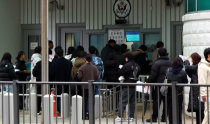Cheonan and the Local Elections
Cheonan and the Local Elections
Posted April. 19, 2010 06:10,
Political circles apparently seek to exploit the sinking of the naval vessel Cheonan to garner more votes in the June 2 local elections. If the ruling or an opposition party tries to use the incident, which is closely related to national security, to advance its political interests, it has no right to be called a public party.
Certain figures in the ruling Grand National Party are apparently attempting to arouse fear against North Korea ahead of the local elections. Under previous authoritarian governments, ruling party candidates used the Norths abrupt provocations to win votes by arousing public fear over national security lapses. With heightened public awareness, however, emphasis on national security does not always promise a favorable outcome for the ruling party.
The announcement of the first inter-Korean summit made shortly before the 2000 general elections under the Kim Dae-jung administration and the second summit in the run-up to the 2007 presidential election had adverse effects on the then ruling party. If the Grand National Party gives the impression that it will use the Cheonans sinking as an opportunity to rally conservative forces to win the elections, this will not only alienate voters but also make the party appear insensitive to national security issues.
For its part, the main opposition Democratic Party is refraining from commenting on the Norths possible involvement in the incident after a civil-military joint investigation team announced its preliminary results on the cause of the sinking. When the incident occurred, the opposition party denied the Norths involvement. Instead, certain party members blamed the incident on the Lee Myung-bak administrations policy failure toward Pyongyang. Regrettably, they ruled out the possibility of a premeditated provocation based on the Norths long-standing strategy to communize the South. When Pyongyang conducted its second nuclear test in May 2008, the Democratic Party and the progressive Democratic Labor Party shifted the blame on the Lee administrations policy toward North Korea, which it called something from the Cold War that led to the nuclear test.
North Korea provoked two inter-Korean naval skirmishes in the Yellow Sea (1999 and 2002) under the Kim Dae-jung and Roh Moo-hyun administrations, two governments that gave their unconditional support to the North. If the Cheonan sank due to the Lee administrations hard-line North Korea policy, how can the opposition explain Pyongyangs provocations in the Yellow Sea and nuclear and missile tests conducted under previous left-leaning governments in South Korea? It is no exaggeration to say the passive reactions of previous South Korean governments to the Norths provocations led to the Cheonan incident. Shielding North Korea and blasting the South Korean government cannot win the hearts and minds of voters.
The ruling and opposition parties should instead use the Cheonan incident as an opportunity to show the people that they are capable of ensuring national security.





![화장실 갇혔을 때 생존법…“최후에는 변기뚜껑” [알쓸톡]](https://dimg.donga.com/c/138/175/90/1/wps/NEWS/IMAGE/2025/12/26/133042007.3.png)

